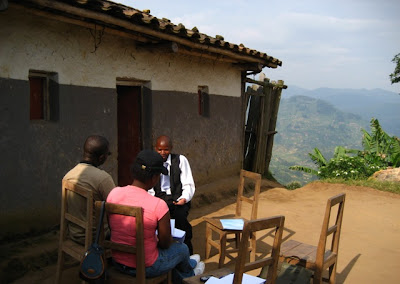This Rwandan forest I keep going on about is a pretty rich and diverse place and people have lived a good life off it for a long time. The soil is great for growing crops and under that there’s lots of gold waiting to be claimed…. there’s a different kind of wood for every purpose you could need, medicines for all ailments and, if you’re hungry, pigs, deer and chickens roaming about. There’s also some of the best honey going and a bit of fruit and veg if you’re so inclined. These things can bring in a decent income.
I remember when all this was fields....I mean forest.
Unfortunately word gets out and when tens of thousands of people are digging, chopping and trapping, the forest starts shrinking. And it’s really in everyone’s interests to keep it there for the rain and the water (and of course all that lovely carbon). But! Imagine you were living the good life by the forest on your nice bit of land and all of a sudden some fella kicked you off and said “this has been made a National Park - don’t come back or I’ll arrest you or shoot you….” - you’d be a little aggrieved. This reality is fresh in the minds of people here and understandably relations with the man have not always been good.
The alternative life you have now involves growing your food on thin, poor soil on steep slopes and your only real work options are seasonal farm labour earning you around 50p a day….50p a day……or taking a risky option of travelling away to dig for gold for a little over £1 a day, when you can get the work. That makes it tough to get a foot on the ladder, tough to plan ahead, tough to feed your family.
Cunning minds have realised that helping all the people that live in the 50+ villages next to the forest actually helps the forest and the government is putting the tourists’ $$$ back into communities, with health centres, schools and goats popping up hither and thither.
One other fine option for a win-win is payments for environmental services (a PES scheme). This one, set up by clever folks in the university in Norwich, involves giving money to every household in a village (and an agreed % to community projects) in return for meeting targets for reduced numbers of snares, trees cut and forest paths made as well as for planting trees in the village and working together to guard crops from the cheeky (and slightly menacing) baboons and other beasties. And to spread the word and monitor this you hire local people.
So! Joseph (researcher/Country Director), Solange (University of Rwanda student) and myself (layabout) are heading to villages and going door to door to see what they think of the scheme and what effect it’s having on the way they do things. First on the list were Murwa (with the scheme) and Kiyabo (without the scheme to compare). They are wedged between Nyungwe forest and the
The presence of large mountains, lack of roads and no power mean this requires some planning……
The poorer houses are made of a bit of wood, a lot of mud and loads of banana leaves.
A step up from this you have bricks and metal sheets.
If you’re doing well for yourself you can get some roof tiles. This is the chief of the village being interviewed and looking smart because 4th July is Liberation Day (from the Belgians).
Everyone gathered in the village to listen to the President's speech on the radio.
And very much unable to merge with the crowd, I was quickly shuffled to a seat facing everyone, alongside church, military and political figures as goats and small children passed by.
Maybe someone knew the President's speech would be delayed and suddenly myself and Joseph were asked to make impromptu speeches to fill in some of the time. I'm not sure any of the gags about growing pineapples in Inverness translated very well......
Which one is number 27?
Not the person to ask directions.
There's someone lurking behind every bush. Admittedly this one is my boss though....
Farming is on some serious slopes here and it’s not unusual for it all to slip away.
Kids following me through a gold mine in Kiyabo.
Murwa perched on the hill (bottom right). The
Joseph talking to community monitors.
Kids who should be looking after goats but have been distracted by a scally.
Getting back up the hill just before the fruit bats come out and it gets pitch black...for once.
Is this a small cow or camera trickery? I don’t think it can get out. Livestock is the main ambition people have, to provide much needed fertiliser and to sell on any young.
Mantis on a banana flower.
Pots warming up and dinner trying to escape in the back corner!
Steaming fufu – cassava bread. One is supposed to slice meaningfully with forefinger.
And back in Butare with my neighbour Gael, trying to improve my language skills.


























No comments:
Post a Comment